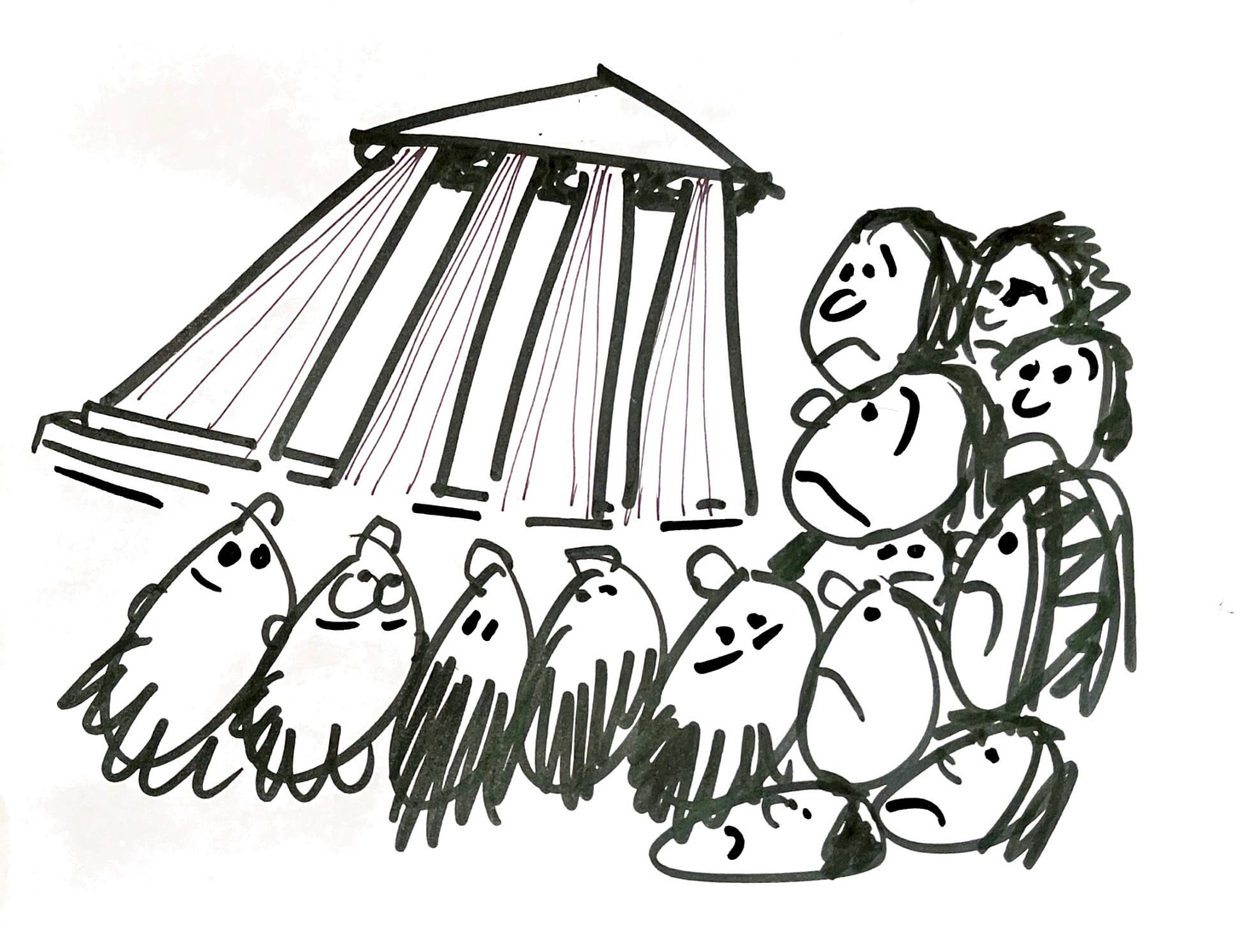Alito’s second flag: He must be impeached
Fool us once, shame on you. Fool us twice, shame on us.
Friends,
Justices of the Supreme Court are the most powerful and least accountable people in American democracy. They have the final say on how the Constitution should be interpreted, the meaning of laws, whether laws align with the Constitution, and what rights Americans have. But they are appointed for life, and make their own ethics rules.
Which is why the Supreme Court rests oddly and sometimes uncomfortably in our system of self-government. The founders called it the “least dangerous branch” of government because it has no direct power over the appropriation of public funds or the enforcement of law. But as long as the other two branches feel bound to its decisions, it can be the most dangerous branch because there is no way of holding justices accountable other than through impeachment.
So far, the only justice to be impeached was Associate Justice Samuel Chase in 1805. The House of Representatives passed Articles of Impeachment against him, but he was acquitted by the Senate. I’ll return to Chase in a moment.
Last summer — two years after an upside-down American flag was displayed outside his home — another flag was displayed at Justice Samuel Alito’s house. This one appeared in front of his vacation house on Long Beach Island, in New Jersey.
Like the inverted U.S. flag, this one — the so-called “Appeal to Heaven” flag — had been carried by rioters at the Capitol on January 6, 2021. It was visible above rioters’ clashes with police on the building’s west terrace and inside the building.
And like the inverted flag, the “Appeal to Heaven” flag is a symbol of support for Trump and the “Stop the Steal” campaign. It’s also tied to the Christian right’s movement to make America into a “Christian nation.”
Alito blamed his wife for flying the inverted U.S. flag in the weeks after the January 6 riot, saying she was responding to a neighbor who put a “F*ck Trump” sign on his lawn. It’s a dubious excuse because a flag flying in front of someone’s home implicates an entire household. And a Supreme Court justice who’s likely to consider legal issues arising from the riot would presumably be aware of — and make extra efforts to avoid — any show of partisanship.
It’s going to be even harder for Alito to attribute the “Appeal to Heaven” flag to his wife. According to The New York Times, Alito’s summer neighbors said that once they realized what the flag signified, they were surprised to see it displayed, particularly in a prominent spot where many boaters glided by.
During the period when the “Appeal to Heaven” flag was displayed, a key January 6 case arrived at the Supreme Court, challenging whether those who stormed the Capitol could be prosecuted for obstruction. In coming weeks, the justices will rule on that case, which could affect some of the charges against Trump. The justices are also considering the question of whether Trump is immune from prosecution for actions he took while president.
The “Appeal to Heaven” flag has become a rallying symbol for far-right evangelicals, for whom Alito has been a hero. He wrote the Dobbs decision, reversing the Supreme Court’s ruling in Roe v. Wade. He offered almost no reasons for such a blatant reversal. There were none, except for the obvious fact that the composition of the Supreme Court had changed dramatically.
Alito has been one of the Supreme Court’s most outspoken religious conservatives. “You can’t say that marriage is a union between one man and one woman,” he said in a 2020 speech. “Until very recently that’s what the vast majority of Americans thought. Now it’s considered bigotry.” It was the same point he had made in his dissent to the Supreme Court’s ruling on marriage equality.
The only real asset possessed by the Supreme Court is the trust of the American people in its judgment. Absent that trust, its opinions are purely political. But if purely political, why should the public defer to them?
The “code of ethics” announced with great fanfare by the court on November 23, 2023, stipulates that “a Justice should disqualify himself or herself in a proceeding in which the Justice’s impartiality might reasonably be questioned, that is, where an unbiased and reasonable person who is aware of all relevant circumstances would doubt that the Justice could fairly discharge his or her duties. Such instances include, but are not limited to, those in which: (a) The Justice has a personal bias or prejudice concerning a party.”
But Alito is not required to follow the code of ethics. He doesn’t have to disqualify himself from cases involving Trump, even though a reasonable person surely would question his impartiality.
There is only one way to hold Alito accountable for diminishing the trust on which the Supreme Court’s role in our democracy is based.
Which brings me back to Samuel Chase. Described as a “staunch Federalist with a volcanic personality,” Chase continued his bitterly partisan rhetoric from the Supreme Court after Jeffersonian Republicans gained control of Congress in 1801. At the urging of President Thomas Jefferson, Representative John Randolph of Virginia orchestrated impeachment proceedings against Chase, accusing him of bias in two politically sensitive cases.
The final article of impeachment specifically accused Chase of continually promoting his political agenda on the bench, thereby “tending to prostitute the high judicial character with which he was invested, to the low purpose of an electioneering partizan.”
On March 12, 1804, the House voted to impeach Chase. A majority of senators found him guilty on three of the eight articles, but their votes fell short of the two-thirds required for conviction.
If Alito refuses to recuse himself from cases involving Trump, Congress should impeach and convict him of no less than tending to prostitute the high judicial character with which he was invested, to the low purpose of blatant partisanship. That is, of violating the basic tenets of impartial justice, on which public trust for the high court is based.
With Republicans in control of the House (by a whisker), such an impeachment is unlikely. But it should at least be initiated. The public’s trust in the Supreme Court is at stake.





"The public’s trust in the Supreme Court is at stake"? I think you'll find that the Supreme Court died around the year 2000, after Bush v. Gore . . .
Trust in the Supreme Court has been non existent for about 24 years. Unless they rule in favor of the GQP, then they are “the law of the land”.
He and Thomas need to be ousted before we lose what’s left of our Democratic Republic.